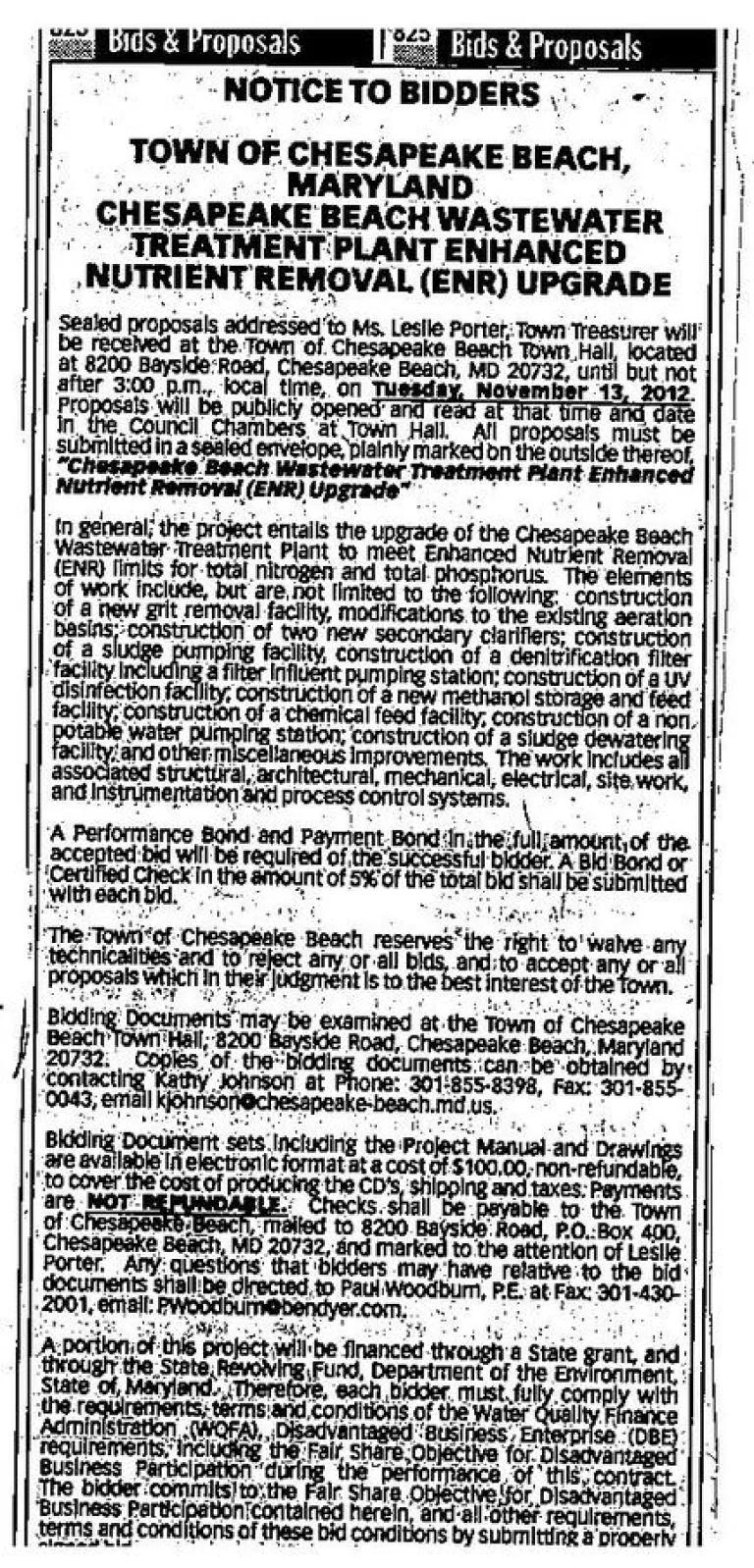In scanning the Classified ads section of the paper recently, I came across the item below. The ad seeks bids to upgrade the wastewater treatment plant in Chesapeake Beach, Maryland, most likely to help meet nitrogen and phosphorus control targets that are contained in the historic Chesapeake Bay cleanup blueprint that the Environmental Protection Agency put in place two years ago.

Because I am a nerd (yes, it gets worse than reading and cutting out a classified ad about enhanced nutrient removal), this entry made me immediately think about the federal budget and the Clean Water Act. Notice a couple things about the ad: first, the project is funded in part by money from the “state revolving fund”; and, second, it will entail significant construction work. These facts are noteworthy because there are impending actions in Congress that threaten the financial assistance that states get from the federal government for water infrastructure and that attack the foundation of the Chesapeake blueprint. If these threats materialize, economic growth and jobs stand to suffer.
The “state revolving fund” is a state-run pot of money used to make loans to municipalities for building and repairing water infrastructure, on terms better than would be available to these communities from the market. State funds are capitalized by grants from the federal government and a 20 percent match from states. Although this financial support has not been equal to the infrastructure needs, as I have noted before, the SRF is a critical tool for addressing pollution from sewage systems and stormwater runoff that threatens public health and our use and enjoyment of waterways. But it is also a job creator. According to one analysis, each billion dollars in water infrastructure investment means over 20,000 jobs, a study EPA used in 2009 to estimate that the program created between 1.4 and 2 million jobs since 1988. In light of those impressive figures, this program should be generously funded at the federal level, but instead it has been targeted for reductions in recent budget cycles and might be slashed further if Congress does not come up with a plan to cut the budget deficit by at least $1.2 trillion. If this “fiscal cliff”(known inside the Beltway as “sequestration”) is reached, the clean water SRF is expected to suffer at least a $120 million cut. That’s 2,400 jobs. Under some scenarios, the damage could be double that.
Another lesson the classified ad helps illustrate is that these projects and their attendant economic and employment benefits come about because of clean water requirements, a fact that confirms the premise of my colleague David Goldstein’s recent piece – environmental regulations can help some industries thrive and establish clear rules of the road for all businesses, both big and small. The corollary to that principle is that jobs on pollution control projects (like the one in Chesapeake Beach) or in industries dependent on clean water would be a casualty of attacks on the legal requirements to clean up pollution. Unfortunately, the Chesapeake cleanup plan has been the target of multiple assaults. For one, the House has passed a bill (and its companion has just been introduced in the Senate) that strikes at the very core of Clean Water Act provisions that support the Bay blueprint – ones that authorize federal action to protect water quality when states fail to do so. In addition, our colleagues at the Chesapeake Bay Foundation have warned that a bill from Representatives Goodlatte (R-VA) and Holden (D-PA) would similarly gut the federal safety net for the Chesapeake Bay in the Clean Water Act. And finally, the Bay cleanup plan has been the target of a “rider” – a provision inserted into a spending bill which would undermine progress on the initiative by starving it of federal funding.
Members of Congress talk a lot these days about jobs. If that’s not just political posturing, then they have a clear path when they return to D.C. after the election – reach a deficit reduction deal that does not cut already under-funded programs like the SRF, but rather takes a balanced approach to deficit reduction that doesn’t try to balance the budget simply by tearing the heart out of the discretionary programs that account for a relatively small part of total federal spending. And, just as importantly, our representatives should leave job-creating clean water requirements alone.




